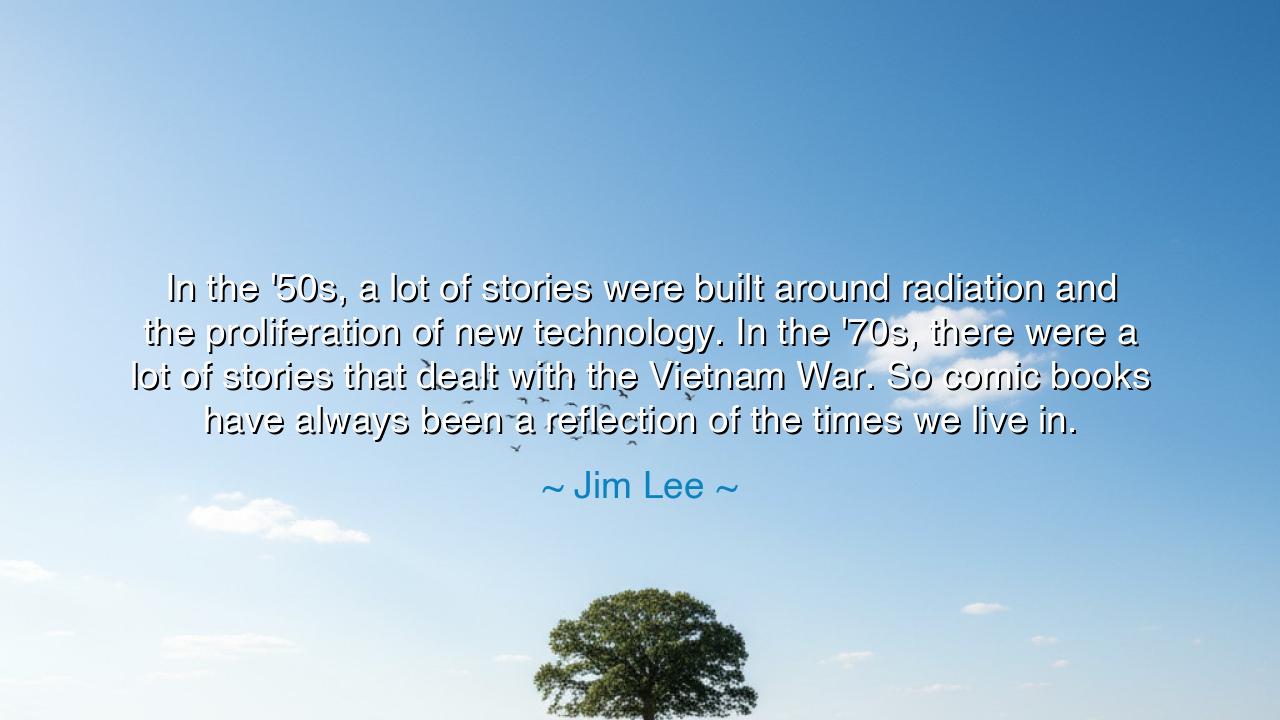
In the '50s, a lot of stories were built around radiation and
In the '50s, a lot of stories were built around radiation and the proliferation of new technology. In the '70s, there were a lot of stories that dealt with the Vietnam War. So comic books have always been a reflection of the times we live in.






Jim Lee, a master of the drawn page, once declared: “In the '50s, a lot of stories were built around radiation and the proliferation of new technology. In the '70s, there were a lot of stories that dealt with the Vietnam War. So comic books have always been a reflection of the times we live in.” Though he speaks of comic books, his words echo the deeper truth that stories, whether sung by bards or drawn in panels, are mirrors of their age. The tales of a people are never born in isolation—they rise from the soil of history, watered by fear, hope, and the struggles of the day.
In the 1950s, when the shadow of nuclear fire spread across the world, fear of radiation seeped into every corner of the imagination. From this fear were born heroes and monsters, beings reshaped by science gone astray. Spider-Man, bitten by a radioactive spider; the Incredible Hulk, torn between rage and reason after a blast of gamma rays—these figures carried within them the anxieties of the nuclear age. The people looked upon these comics and saw their own dread transformed into story, their terrors given faces they could confront upon the page. Thus, technology and its dangers became myth, and myth gave the people courage.
In the 1970s, the world was shaken by the long agony of the Vietnam War. Trust in government eroded, and faith in unquestioned authority crumbled. Comic books shifted too, no longer presenting only shining heroes in capes, but flawed champions, uncertain, struggling in morally gray worlds. Characters like the anti-hero Wolverine or the conflicted Punisher reflected the wounded soul of a nation scarred by war and protest. The stories of that decade revealed not only battles of fists and powers, but battles of conscience, echoing the turmoil of the streets.
This truth is not unique to comics; it is the eternal nature of storytelling. In ancient Greece, the plays of Aeschylus and Sophocles wrestled with war, fate, and the will of the gods, reflecting the city-states’ struggles with empire and loss. In Shakespeare’s England, the stage overflowed with questions of monarchy, betrayal, and ambition, mirroring the turbulence of Elizabethan politics. In every age, the artist is both a creator and a witness, shaping the world into narrative form so that the people may see themselves more clearly.
Jim Lee’s wisdom, then, reminds us that comic books are not trivial amusements, but modern epics, carrying the spirit of their age as surely as Homer carried the spirit of his. What was once sung to the lyre is now drawn in ink, but the purpose remains the same: to transform history into myth, and myth into guidance. Through the struggles of fictional heroes, we learn how to face our own. Through their falls and triumphs, we process our fears and renew our hope.
The lesson for us is clear: when you look upon the art of your time—whether film, novel, or comic book—do not see it as mere entertainment. Look deeper, and you will see the heartbeat of your age, the reflections of its fears and longings. And in the same way, when you create, whether in words or in deeds, let your work be honest to the moment you live in. Let it speak of what your generation suffers, dreams, and seeks, so that those who come after may know what it meant to live in these times.
Thus, dear listener, take Jim Lee’s words as a reminder of the sacred bond between art and life. Stories are not idle diversions—they are the chronicles of the human soul. In the '50s, they bore the weight of nuclear dread. In the '70s, they carried the scars of war. And today, they bear our anxieties of climate, identity, and the digital future. Comic books, like all stories, are our mirrors. To honor them is to honor ourselves.






AAdministratorAdministrator
Welcome, honored guests. Please leave a comment, we will respond soon